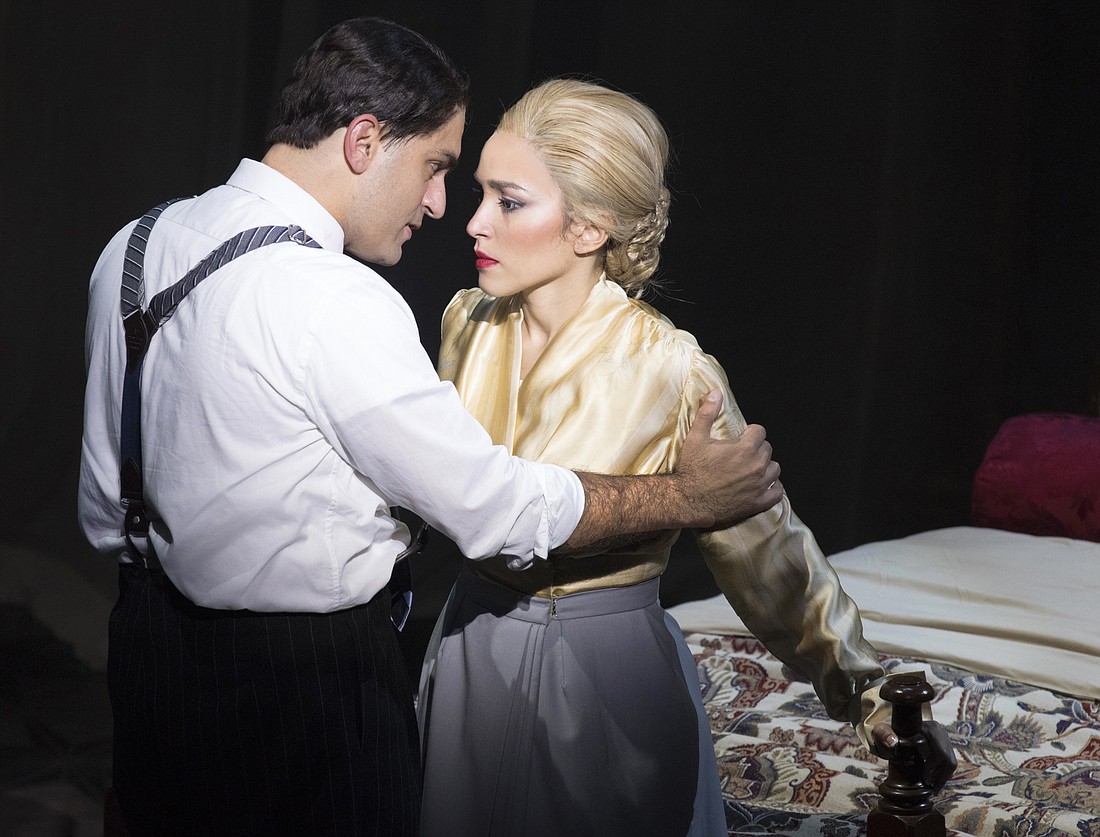- January 15, 2025
-
-
Loading

Loading

I’d like to start this review off with my conclusion: Asolo Repertory Theatre’s production of “Evita” is a stunning piece of music theater that should not be missed!
Why start it this way? Well, I’ve never been that entranced by the works of Andrew LLoyd Webber, even though I’ve seen almost all of them — including several in London, where they first surfaced.
“Evita,” like it’s predecessor “Jesus Christ Superstar,” was originally conceived as a “concept album” telling its own story through the chronology of the songs it included. The transfer from vinyl to stage involved more than the physical aspects of production. It meant stitching the songs together with spoken or musical dialogue, dance and other theatrical vehicles to make a music and dramatic whole.
Much of the time he seems to have a paucity of melodic ideas, usually taking one good melody and using it over and over with some variations, until we are usually tired of it by the end of the evening. And then there are the longish stretches of extended talk-sing-speech, not really recitative, which are needed to move the plot forward between the musical numbers.
Now for the good stuff. This new production — and it is thrillingly new — of “Evita” is actually so outstanding that if it were the original one on Broadway, it might still be running. Talk about a makeover. From the inspired casting, design and direction to the actual performance, it is both a revelation and a revolution. Wisely, the casting of primarily Latino performers has given it an extra amount of authenticity and heart lacking in other productions. And the dances that have been added make it seem that everyone is always moving, and rightly so, to that Argentinian beat. “Evita” is both beautifully staged and choreographed by Josh Rhodes on the basic but evocative set designed by Paul Tate DePoo III, which, with the lighting and projections by Paul Miller and Alex Basco Koch, provide a wonderful world and ambience for the actors.
Ana Isabelle, already a star in her native Puerto Rico, commands the stage whenever she enters, whether she is dancing the tango early on, singing the show’s big hit “Don’t Cry for Me, Argentina,” or merely standing still. Like Eva Perón, she is a presence. And she is ably partnered by Justin Gregory Lopez as Che Guevara, who isn’t a historical partner in this enterprise, but serves as both a Greek Chorus-like commentator and facilitator of events, while Nick Duckhart, as Peron, is fitting as both a consort and foil for Evita’s ambitions.
The balance of the cast, the largest in Asolo Rep’s history according to Producing Artistic Director Michael Donald Edwards, is uniformly excellent in character, voice and movement — and it is constantly on the move, as are the settings enhanced by Alex Basco Koch’s projections and the lighting design of Paul Miller. Even though we feel that all is in motion all the time, there are moments of repose, which are captivating.
The sound design by Will Pickens is notable in that it never overpowers, but is both supportive and reinforcing without enveloping us in tsunamis of distorted loudness. The 12-piece orchestra is conducted by Sinai Tabak, who also presided over “Josephine” and “Guys and Dolls,” and contributed extra musical arrangements, which sounded full without overpowering singers or audience.
And of course, there is the pervasive question these days: “Is Evita a musical or an opera?” Sir Lloyd Webber has sometimes referred to his pieces as “rock operas,” since they are sung through without dialogue, per se. Stephen Sondheim has been faced with a similar question with his “Sweeney Todd” and other works. There isn’t a decisive answer, but there could be one deciding factor: opera is for the most part musically and melodically based, and music theater is for the most part lyric driven. Of course there are many examples to both prove and disprove each opinion.
In the end, the question is, “Was it an enjoyable evening in the theater?” And for “Evita” the answer is a resounding “yes!” Don’t miss it.